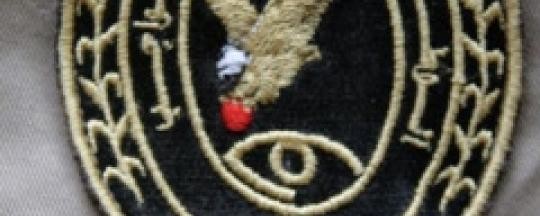US Treasury sanctions Sudan’s Central Reserve Police over serious human rights abuses
The USA Department of the Treasury’s Office of Foreign Assets Control (OFAC) sanctioned the Republic of the Sudan Central Reserve Police (CRP, popularly known as Abu Tira) for serious human rights abuse yesterday. The Treasury listed the excessively violent repression of peaceful pro-democracy protests by the security forces as the main reason.
 The USA Department of the Treasury's official seal
The USA Department of the Treasury's official seal
Patch on the uniform of the Central Reserve Police that shows an eagle clutching a red sun over an Eye of Horus, with the Arabic text “Central Reserve, the Police in Service of the People.” (File photo: Enough Project)
The US Department of the Treasury’s Office of Foreign Assets Control (OFAC) sanctioned Sudan’s Central Reserve Police (CRP) for serious human rights abuse yesterday. The Treasury listed the excessively violent repression of peaceful pro-democracy protests by the security forces as the main reason.
“The CRP has used excessive force against pro-democracy protesters peacefully demonstrating against the military-led overthrow of the civilian-led transitional government in Sudan”, the Department of the Treasury’s statement read.
“Since the October 25 [2021] military takeover, Sudan’s Central Reserve Police has used excessive force and violence intended to silence civilian activists and protesters”, said Under Secretary of the Treasury for Terrorism and Financial Intelligence Brian E. Nelson when announcing the decision.
“We condemn Sudan’s security services for killing, harassing, and intimidating Sudanese citizens. These actions are exacerbating the crisis in Sudan and are a direct contradiction to the Sudanese security services’ stated commitment to participate constructively in a facilitated process to resolve Sudan’s political crisis and return to a democratic transition”.
‘We condemn Sudan’s security services for killing, harassing, and intimidating Sudanese citizens’ – OFAC
The CRP, also known as Central Reserve Forces, is a militarised Sudanese police unit that has been at the forefront of the Sudanese security forces’ violent response to peaceful protests in Khartoum, the Treasury explained. The CRP and the anti-riot police played a central role in what is known as the January 17 Massacre, in which security forces used excessive violence, killed seven protesters, and wounded at least one hundred more during peaceful demonstrations in Khartoum.
“OFAC designated the CRP pursuant to Executive Order (E.O.) 13818 for being a foreign person responsible for or complicit in, or that has directly or indirectly engaged in, serious human rights abuse”, the statement read.
As a result of this decision, “all property and interests in property of the CRP that are in or come within the United States, or that are in the possession or control of U.S. persons, are blocked and must be reported to OFAC”.
The ultimate goal of the sanctions is not to punish, but to bring about a positive change in behaviour, the OFAC explained. This is possible because organisations and people can be placed on the sanctions list but also removed from the sanctions list if the situation changes.
Executive Order 13818 was issued in 2017 “in recognition that the prevalence of human rights abuse and corruption that have their source, in whole or in substantial part, outside the United States, had reached such scope and gravity as to threaten the stability of international political and economic systems.
“The United States seeks to impose tangible and significant consequences on those who commit serious human rights abuse or engage in corruption, as well as to protect the financial system of the United States from abuse by these same persons”, the statement read.











 and then
and then